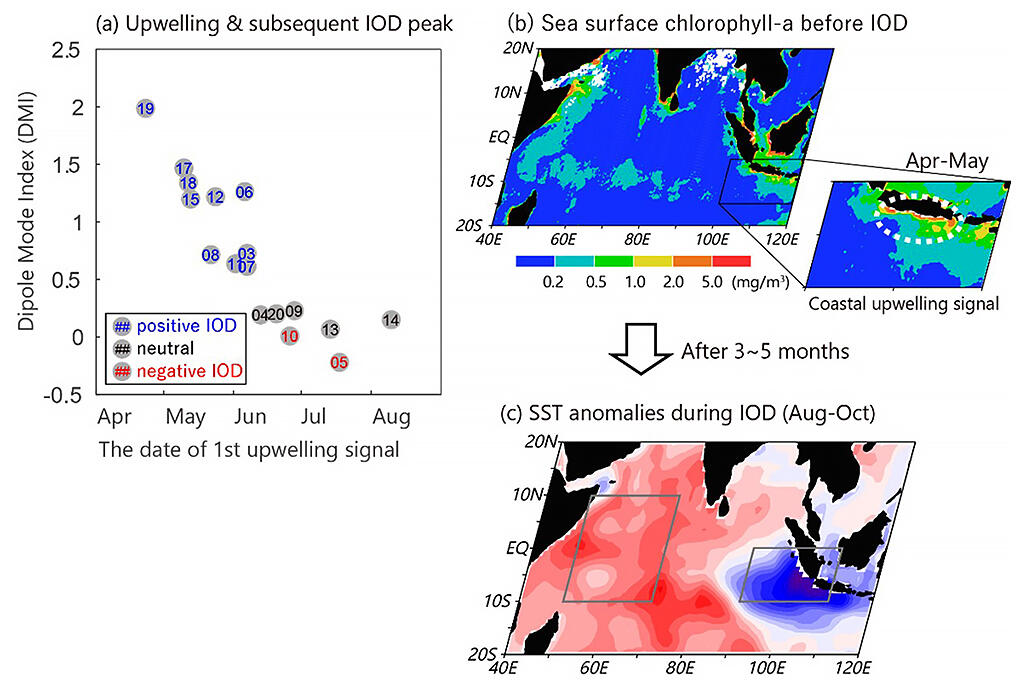A research group led by Senior Researcher Takanori Horii of the Center for Coupled Ocean-Atmosphere Research (CCOAR), the Japan Agency for Marine-Earth Science and Technology (JAMSTEC), has found that localized coastal upwelling in the eastern Indian Ocean south of Java could trigger the onset of the Indian Ocean Dipole (IOD), a large-scale short-term climate variability event in the Indian Ocean.

Provided by JAMSTEC
IOD is a short-term climate variability event in which sea surface temperatures change on an annual basis over a wide area of several thousand kilometers in the tropical Indian Ocean. This widespread change in sea surface temperature is accompanied by changes in global atmospheric circulation, which affects weather patterns in the countries in the Indian Ocean region and all over the world, including Japan. As such, predicting the IOD early and accurately is critical for tropical climate change research and, by extension, for understanding global climate change. Previous research has linked coastal upwelling south of Java to the IOD, but the causal relationship has been unclear due to a lack of ocean observation data.
Senior Researcher Horii commented "Although cold water from coastal upwelling was known to appear south of Java, Indonesia, several months before the IOD, the causal relationship between these events was not clear, and so we have been working on this issue."
As for the coastal upwelling south of the Java Islands, oceanographic measurements with observation equipment were difficult due to active fishing in the area, so the group used satellite data for this project. Coastal upwelling in Java occurs on average around mid-June. They used the data to examine the timing of the first coastal upwelling in each year and the subsequent IOD and found that in years when the coastal upwelling occurred about one to two months earlier than usual, around April to May, a positive IOD occurred several months later, around August to October.
To ascertain whether coastal upwelling was the cause of the positive IOD, they used atmospheric and oceanographic data to examine how the atmosphere and ocean in the eastern Indian Ocean have fluctuated with earlier coastal upwelling events in the past. They found that the Indian Ocean Madden-Julian oscillation (MJO) blowing from April to May effectively combined with oceanic fluctuations to produce earlier-than-average coastal upwellings, and that these winds simultaneously generated stronger-than-normal westward currents off the south coast of Java. By combining sea surface temperature and ocean currents data and other data to calculate the thermal balance of the eastern Indian Ocean, the researchers were able to confirm that cold water from coastal upwelling that occurred early in the year is spread over a wide area of the eastern Indian Ocean by these westward currents, creating ocean conditions favorable for positive IODs.
"We would like to apply the results of our research to ocean simulations using supercomputers to improve the forecast performance of climate change events," says Horii. "We also believe it is important to work with Indonesia to successfully conduct oceanographic observations in the waters south of Java."
■ Madden-Julian oscillation (MJO): Active convective activity in the tropical atmosphere moving eastward at about 4 m/s to 8 m/s over warm ocean waters, mainly in the tropical Indian Ocean. With the passage of this convective activity, the tropical Indian Ocean experiences alternating periods of increased precipitation with strong westerly winds and decreased precipitation with easterly winds, with a cycle of 20 to 50 days. In the waters south of Java, coastal upwelling may occur in conjunction with this easterly wind.
Journal Information
Publication: Geophysical Research Letters
Title: Can Coastal Upwelling Trigger a Climate Mode? A Study on Intraseasonal-Scale Coastal Upwelling Off Java and the Indian Ocean Dipole
DOI: 10.1029/2022GL098733
This article has been translated by JST with permission from The Science News Ltd.(https://sci-news.co.jp/). Unauthorized reproduction of the article and photographs is prohibited.




